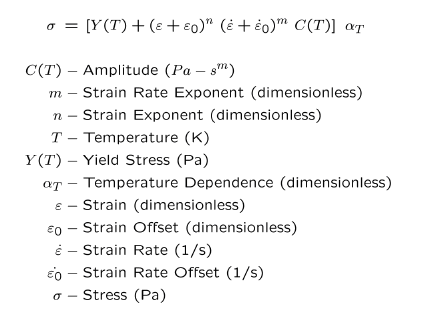Metal Forming Power Law |

|

|

|

|
|
Metal Forming Power Law |

|

|

|

|
The generalized power law used in HyperXtrude is given by the following expression.
 |
Depending on the choice for the variable TemperatureDependence, four different variants of the PowerLaw model can be obtained. Valid entries for the variable TemperatureDependence can be None, Coefficients, Exp(Q/RT), or Exp(-Beta(DeltaT)). Syntax for PowerLaw model with temperature dependence None is given below.
Workpiece |
Aluminum |
{ |
|
ConstitutuveModel = |
"PowerLaw" |
|
Density = |
ρ |
|
SpecificHeat = |
Cp(T) |
|
Conductivity = |
K(T) |
|
CoeffOfThermalExpansion = |
βT |
|
VolumetricHeatSource = |
Qvol |
|
Amplitude = |
C |
|
ConstantY = |
Y |
|
StrainRateHardeningExponent = |
m |
|
StainHardeningExponent = |
n |
|
ReferenceTemperature = |
T0 |
|
SolidusTemperature = |
Ts |
|
LiquidusTemperature = |
Tl |
|
TemperatureDependence = |
"None" |
|
StrainOffset = |
ε1 |
|
StrainRateOffset = |
ε2 |
|
YoungModulus = |
E |
|
PoissonRatio = |
ν} |
Field |
Description |
||||
None |
Even for the case where there is no temperature dependence, a reference temperature should be specified. In this case, the properties are computed at this temperature. |
||||
Coefficients |
With this option, the parameters Amplitude and ConstantY can depend on temperature and you can specify them using a TABLE or FUNCTION. The only difference between the Coefficients and None is that properties are constant in the case on None. |
||||
Exp(Q/RT) |
In this case, in addition to ReferenceTemperature (T0), two other parameters, ActivationEnergy (Q) and UniversalGasConstant (R), are needed by the model. The following two lines should be added to the syntax.
|
||||
Exp(-Beta (DeltaT)) |
In this case, in addition to ReferenceTemperature (T), parameters, Beta (beta) is needed by the model. The following line should be added to the original syntax. Beta = β |